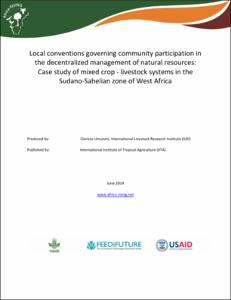Resource information
A study was conducted in southern Mali to analyze and document existing local conventions governing the management of natural resources in the mixed crop-livestock systems. Both the Participatory Rural Appraisal (PRA) and individual interviews were conducted to collect information. In total, the group discussions included 27 administrative and technical services and 53 community authorities all genders combined, and individual surveys involving 165 farmers including 54 women. The information collected during these interviews included among others the condition of natural resources in the different study areas, the farmers' level of knowledge on existing local conventions, the strengths and weaknesses of existing local conventions, the farmers’ participation in the process of developing and implementing local conventions. The results of this study showed that local conventions governing natural resources management exist in all study sites. However, the majority was informal (oral). In addition, level of knowledge of the local conventions differs from one individual to another. Overall, level of knowledge of local conventions was higher in the district of Bougouni (good = 3.16) than in the district of Koutiala (average = 1.70). In addition, women’s level of knowledge was lower compared to that of men. The results also showed that the participation of community members in the elaboration process and implementation of local conventions was very low in all study sites and tended to be dominated by a group of individuals, often leaders and traditional elites. Women were essentially marginalized in the elaboration process and implementation of local conventions compared to men. Thus, promoting the participation of community members especially women's in the development and implementation of local conventions processes seems essential for a sustainable management of natural resources.



